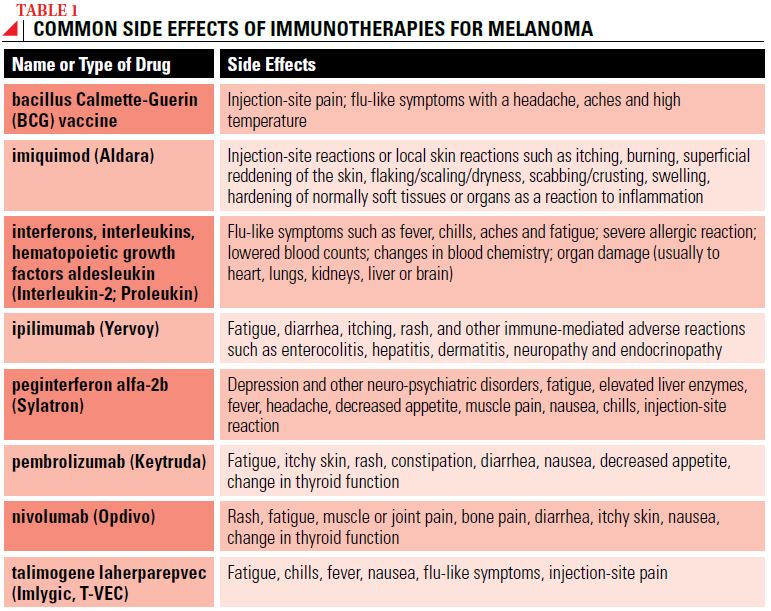
Flu-like Symptoms
Flu-like symptoms, such as fever, chills, aches, headache, drowsiness, nausea, vomiting, loss of appetite and low blood cell counts, can occur if treatment includes cytokines or oncolytic virus therapy. These symptoms can range from mild to severe.
To manage flu-like symptoms, getting enough rest will be important. You might recommend taking acetaminophen. You also might suggest taking any oral treatments at bedtime to help minimize symptoms. If a cough develops, suggest they drink plenty of water and other fluids to keep their throat moist.
Diarrhea
Diarrhea is a common side effect with the checkpoint inhibitor class of immunotherapies for melanoma, specifically the PD-1 and CTLA-4 inhibitors.
The symptoms can vary in severity and duration. It is important to discuss what to expect with this side effect, including how long it may last and when to consider emergency treatment. Diarrhea can lead to severe dehydration and electrolyte imbalance but also could be a symptom that the immune system is going into overdrive.
Tips to manage diarrhea include drinking clear liquids, avoiding milk products, eating low-fiber foods, eating frequent small meals, choosing foods that are high in potassium, avoiding foods that can irritate the digestive tract and trying probiotics. Anti diarrheals may be useful for minimal diarrhea but corticosteroids should be started if more than seven bowel movements per day occur, or if diarrhea is associated with crampy abdominal pain or hemorrhage.
Remind patients to call your health care team if they experience symptoms that interfere with their daily activities, such as severe abdominal cramping, or that cause them to fear leaving their home.
Mild Skin Reactions
Mild skin reactions, such as bumpy or itchy red rashes, can occur. Checkpoint inhibitors most often feature itching and/or rashes as common side effects.
Other skin problems include yellowing or other changes in skin color, blistering, hives, pale patches and flushing or redness.
Although these symptoms are rarely severe, they can be very uncomfortable. Depending on the type of itching, you might recommend a corticosteroid or a topical anesthetic. If the itching affects their sleep, the doctor may prescribe an antihistamine, such as cetirizine (Zyrtec) or diphenhydramine (Benadryl). Medicated creams may be prescribed to help manage itchy skin or rashes. In some cases of rash, antibiotics may be prescribed.
Early treatment may improve your patients’ symptoms, so encourage them to contact the treatment team at the first sign of a reaction.
Depression
Depression is a common side effect of cancer and its treatment. It can affect mood, behavior, and ability to think and concentrate, as well as initiate physical symptoms including fatigue, loss of appetite, difficulty falling asleep or extreme tiredness. Some treatments are associated with mood changes, such as depression, suicidal thoughts or other psychiatric conditions. If your patients notice any mood changes that develop as part of their treatment, recommend that they call the physician’s office.
It is very important to discuss any concerns the patient may have about potential side effects before their treatment starts. Communication between your health care team and the patient is crucial for managing side effects during immunotherapy. Provide patients with a list of whom to contact if they have urgent questions or if side effects develop, especially after normal office hours.
©Patient Resource